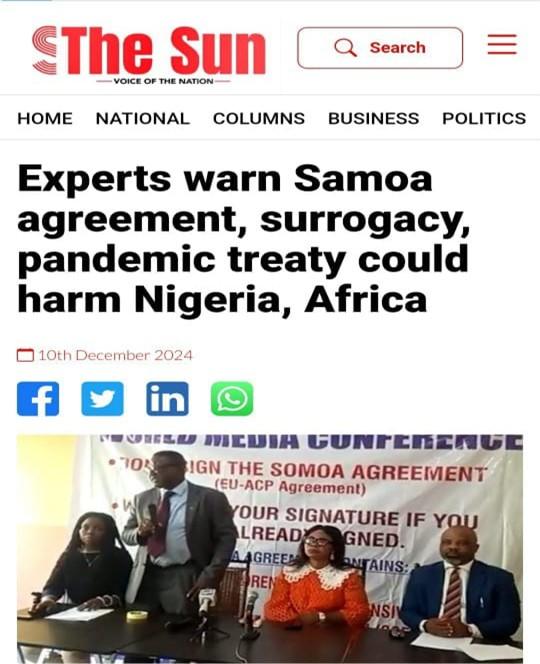
By Sylvia Mesesi
Held at Home Touch Place, Surulere, Lagos, the event addressed concerns surrounding the Samoa Agreement, surrogacy, and the WHO Pandemic Treaty. Here’s an overview of the issues discussed and their potential impact:
Samoa Agreement
Originally known as the Cotonou Agreement and initiated in 1975 as a trade treaty between the EU and African, Caribbean, and Pacific (ACP) nations, the Samoa Agreement has since evolved to include controversial provisions. Despite public opposition, Nigeria signed this agreement, which now promotes policies that conflict with its laws and cultural values.
During the press conference, it was highlighted that key provisions in the Samoa Agreement endorse LGBTQ+ rights, abortion, and Comprehensive Sexuality Education. For example, Article 36(2) references sexual and reproductive health rights, defined by the EU to include sexual orientation and gender identity. The participants stated that these policies directly contradict Nigeria's Same-Sex Marriage (Prohibition) Act of 2014.
The agreement also gives the EU undue influence over African nations through a “Council of Ministers” with the power to enforce binding decisions. Nigerian and African leaders were therefore urged to withdraw from the agreement or insist on amendments to protect their sovereignty and cultural heritage.
Surrogacy in Nigeria
Surrogacy, which involves renting a woman’s womb for childbirth, is growing in Nigeria despite being illegal under the 1999 Constitution and various national laws. A proposed bill to regulate surrogacy has raised alarm among human rights and faith-based groups in Nigeria.
The press conference pointed out that surrogacy exploits women, reduces childbirth to a commercial transaction, and disrupts the identity rights of children born through this practice. It called for an outright ban on surrogacy in Nigeria, citing its incompatibility with the country's cultural and legal framework.
WHO Pandemic Treaty
The WHO’s proposed Pandemic Treaty also came under scrutiny. This treaty aims to centralize health policy decisions under the WHO’s authority, potentially compromising national sovereignty. It would allow the WHO to mandate lockdowns, mask usage, and even vaccination campaigns during pandemics, bypassing local governments.
Additionally, the treaty promotes the controversial One Health approach, tying public health to climate change and ecosystem management. The press conference warned that such broad powers could lead to the imposition of universal health policies, including the distribution of abortion kits and contraceptives, under the guise of pandemic preparedness.
Impact and Call to Action
The press conference highlighted the importance of protecting African values and sovereignty against neo-colonial policies disguised as trade or health initiatives. By bringing these issues to global attention, it empowered Nigerians and Africans to demand accountability and cultural sensitivity from international partners.
As Mrs. Haleemah Alli-Bankole from Advocacy for Moral Sex Education (AMOSED) stated, “Democracy must respect the cultural and religious convictions of the people. Policies imposed without this respect are nothing but disguised despotism.”
CCI remains committed to supporting advocacy efforts and encouraging African nations to prioritize their values. Moving forward, stakeholders are urged to review such agreements critically and take firm action to safeguard their cultural and legal autonomy. Furthermore, CCI is also committed to advising parliaments against ratifying such treaties and incorporating them into law, ensuring that national sovereignty and traditional values are upheld.
For more information click on the following links:
- https://youtu.be/zWK7ayq4Yhc?si=LrT5hm6aZvABmeDr
- https://af24news.com/experts-warn-against-potential-threats-of-samoa-agreement-other-treaties-on-nigeria-africa/
- https://citylawyermag.com/samoa-agreement-illegal-withdraw-now-csos-tell-fg/
Sylvia Mesesi is CCI Policy Officer Africa
